Our Aim
To provide you with an overview on New And existing technologies, hopefully helping you understand the changes in the technology. Together with the overviews we hope to bring topical issues to light from a series of independent reviewers saving you the time And hassle of fact finding over the web.
We will over time provide you with quality content which you can browse and subscribe to at your leisure.
TekSpek 's

NVIDIA GeForce RTX 3080Ti
Date issued:
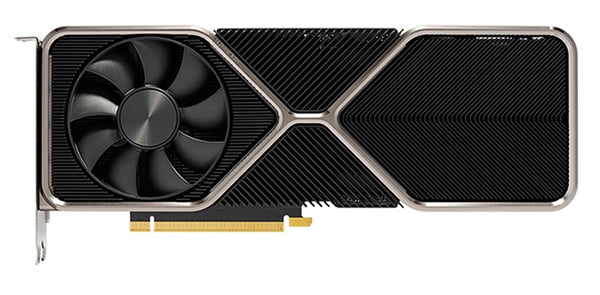
NVIDIA dialled it up to 11 when launching the GeForce 30-series premium graphics cards last September. Built on the all-new Ampere architecture offering a step-change in performance from the previous generation, the chip giant has expanded the family to now include, from top to bottom, the GeForce RTX 3090, RTX 3080, RTX 3070, RTX 3060 Ti and RTX 3060. Catering for a wide range of budgets and performance requirements, there's a card for almost every gamer.
It has become customary for Nvidia to add in more cards months after initial launch, with the thought process being one of providing gamers and enthusiasts even greater levels of choice. Such thinking leads us on the GeForce RTX 3080 Ti - a premium solution designed to fill the gap between existing RTX 3080 and RTX 3090.
The simplest method of describing this new, high-octane GPU is to look at the vital statistics in relation to its peers, as illustrated in the table below.
Ampere and Turing Compared | |||||||||||
|---|---|---|---|---|---|---|---|---|---|---|---|
| RTX 3090 | RTX 3080 Ti | RTX 3080 | RTX 3070 | RTX 3060 Ti | RTX 3060 | RTX 2080 Ti | RTX 2080 Super | RTX 2080 | RTX 2070 Super | ||
| Launch date | Sep 2020 | June 2021 | Sep 2020 | Oct 2020 | Dec 2020 | Feb 2021 | Sep 2018 | July 2019 | Sep 2018 | July 2019 | |
| Codename | GA102 | GA102 | GA102 | GA104 | GA104 | GA106 | TU102 | TU104 | TU104 | TU104 | |
| Architecture | Ampere | Ampere | Ampere | Ampere | Ampere | Ampere | Turing | Turing | Turing | Turing | |
| Process (nm) | 8 | 8 | 8 | 8 | 8 | 8 | 12 | 12 | 12 | 12 | |
| Transistors (bn) | 28.3 | 28.3 | 28.3 | 17.4 | 17.4 | 12 | 18.6 | 13.6 | 13.6 | 13.6 | |
| Die Size (mm²) | 628.4 | 628.4 | 628.4 | 392.5 | 392.5 | 276 | 754 | 545 | 545 | 545 | |
| PCIe | 4.0 | 4.0 | 4.0 | 4.0 | 4.0 | 4.0 | 3.0 | 3.0 | 3.0 | 3.0 | |
| Base Clock (MHz) | 1,400 | 1,365 | 1,440 | 1,500 | 1,500 | 1,320 | 1,350 | 1,650 | 1,515 | 1,605 | |
| Boost Clock (MHz) | 1,695 | 1,665 | 1,710 | 1,725 | 1,665 | 1,777 | 1,545 | 1,815 | 1,710 | 1,770 | |
| Founders Edition Clock (MHz) | 1,695 | 1,665 | 1,710 | 1,725 | 1,665 | N/A | 1,635 | 1,815 | 1,800 | 1,770 | |
| Shaders | 10,496 | 10,240 | 8,704 | 5,888 | 4,864 | 3,584 | 4,352 | 3,072 | 2,944 | 2,560 | |
| GFLOPS | 35,581 | 34,099 | 29,768 | 20,314 | 16,197 | 12,737 | 13,448 | 11,151 | 10,068 | 9,062 | |
| Founders Edition GFLOPS | 35,581 | 34,099 | 29,768 | 20,314 | 16,197 | N/A | 14,231 | 11,151 | 10,598 | 9,062 | |
| Tensor Cores | 328 | 320 | 272 | 184 | 152 | 112 | 544 | 384 | 368 | 320 | |
| RT Cores | 82 | 80 | 68 | 46 | 38 | 28 | 68 | 48 | 46 | 40 | |
| Memory Size | 24GB | 12GB | 10GB | 8GB | 8GB | 12GB | 11GB | 8GB | 8GB | 8GB | |
| Memory Bus | 384-bit | 384-bit | 320-bit | 256-bit | 256-bit | 192-bit | 352-bit | 256-bit | 256-bit | 256-bit | |
| Memory Type | GDDR6X | GDDR6X | GDDR6X | GDDR6 | GDDR6 | GDDR6 | GDDR6 | GDDR6 | GDDR6 | GDDR6 | |
| Memory Clock | 19.5Gbps | 19Gbps | 19Gbps | 14Gbps | 14Gbps | 15Gbps | 14Gbps | 15.5Gbps | 14Gbps | 14Gbps | |
| Memory Bandwidth | 936 | 912 | 760 | 448 | 448 | 360 | 616 | 496 | 448 | 448 | |
| ROPs | 112 | 112 | 96 | 96 | 80 | 48 | 88 | 64 | 64 | 64 | |
| Texture Units | 328 | 320 | 272 | 184 | 152 | 112 | 272 | 192 | 184 | 160 | |
| L2 cache (KB) | 5,120 | 5,120 | 5,120 | 4,096 | 4,096 | 2,304 | 5,632 | 4,096 | 4,096 | 4,096 | |
| SLI | Yes | No | No | No | No | No | Yes | Yes | Yes | Yes | |
| Power Connector (FE) | 12-pin | 12-pin | 12-pin | 12-pin | 12-pin | 8-pin | 8-pin + 8-pin | 8-pin + 6-pin | 8-pin + 6-pin | 8-pin + 6-pin | |
| TDP (watts) | 350 | 350 | 320 | 220 | 200 | 170 | 250 | 250 | 215 | 215 | |
| Founders Edition TDP (watts) | 350 | 350 | 320 | 220 | 200 | N/A | 260 | 250 | 225 | 215 | |
| Suggested MSRP | $1,499 | $1,199 | $699 | $499 | $399 | $329 | $999 | $699 | $699 | $499 | |
| Founders Edition MSRP | $1,499 | $1,199 | $699 | $499 | $399 | N/A | $1,199 | $699 | $799 | $499 | |
Using the same underlying Ampere architecture, it is clear to see the GeForce RTX 3080 Ti's provenance. NVIDIA uses what is known as GA102 silicon - common on the three highest-end cards - and repurposes it intelligently for this new powerhouse.
Running down the vital stats illuminates clear truths. The RTX 3080 Ti is closer in design to the RTX 3090 than it is to its namesake, RTX 3080. Compared to RTX 3090, it has almost the same number of processing shaders, RT Cores, Tensor Cores and ROPs, while memory bus width is the same at 384 bits.
The two key parameters in evaluating the performance of a GPU based on the same architecture are GFLOPS and memory bandwidth. It's no surprise that RTX 3080 Ti gets very close to RTX 3090 on both fronts.
So why consider the RTX 3090 at all when it is more expensive and, as we have discussed, ought to perform almost the same? Good question. Nvidia's segmentation strategy halves the RTX 3080 Ti's memory footprint to 12GB, which means it may not work as well for those thinking about also using their GeForce as a creator/high-end multimedia card. Secondly, RTX 3080 Ti doesn't have NV-Link technology, where one can tie two cards together for even-higher framerates. Third, the RTX 3090 Founders Edition uses a larger, more powerful cooler.
Even so, the GeForce RTX 3080 Ti remains a very compelling solution to those enthusiasts who don't need the extra capability of the range-topping model. Performance benchmarks from leading review sites underscore just how compelling it is.
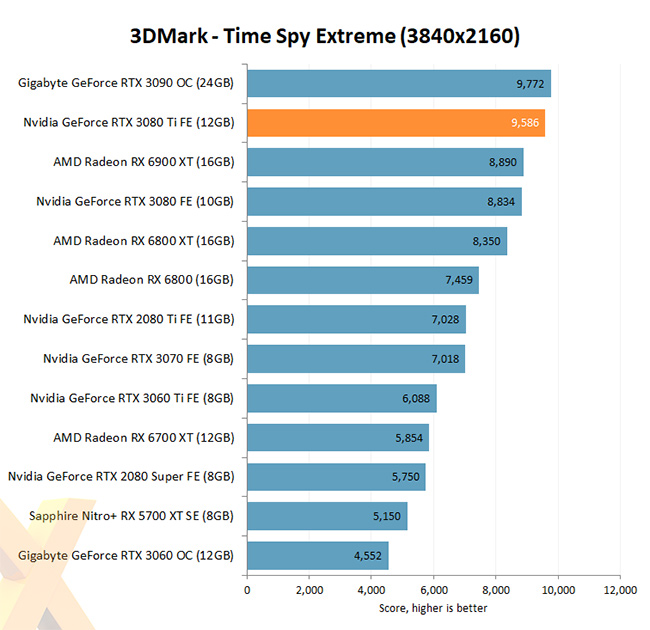
Performance in the difficult 3DMark Time Spy Extreme test is a whopping 98 per cent of the RTX 3090's.
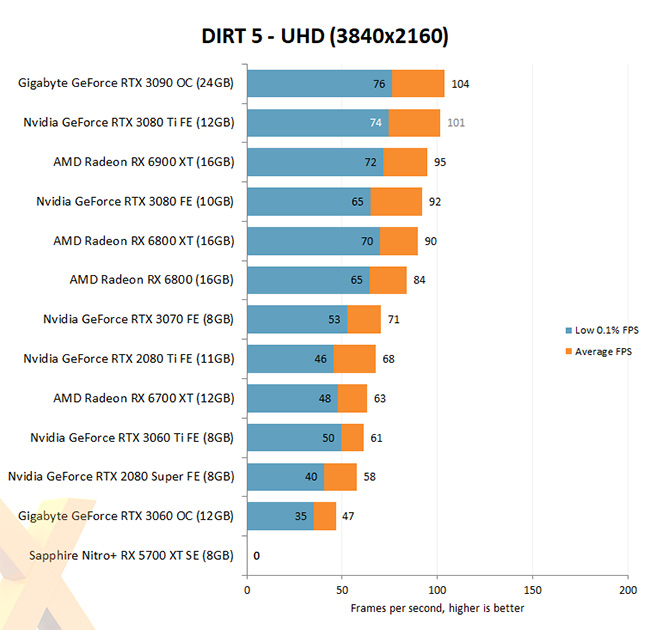
Playing actual games with raytracing on and settings at the highest levels at a lusty 4K resolution also show just how closely the two chief Nvidia GPUs perform. RTX 3080 Ti offers 97 per cent of the RTX 3090's numbers and about 10 per cent more oomph than the already-impressive RTX 3080 released last September.
RTX 3080 Ti, meanwhile, offers a massive 49 per cent performance jump over the best card of the last generation, RTX 2080 Ti, which can be particularly telling at the highest settings.
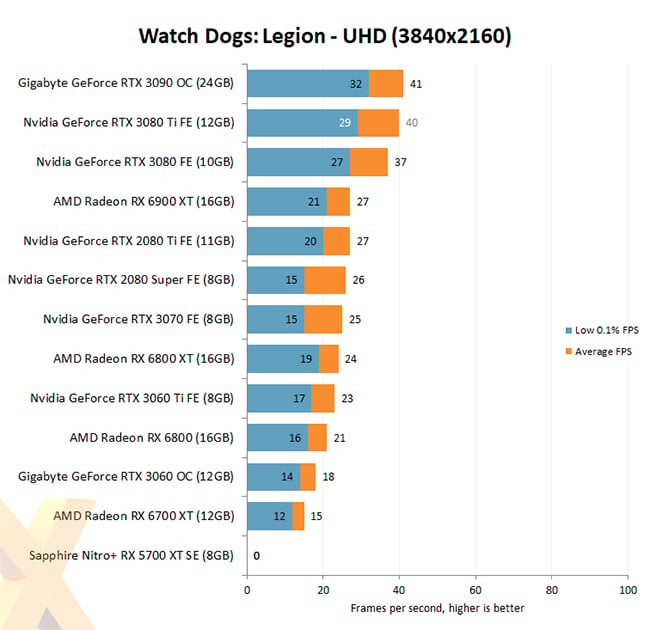
In gaming titles primed to take advantage of NVIDIA's superior raytracing performance, such as Watch Dogs: Legion, the gap between leading GeForces and rival Radeons is larger. And that's without even taking NVIDIA's framerate-boosting DLSS technology into account.
The NVIDIA GeForce RTX 3080 Ti is a monster of a graphics card ideally suited to playing the latest games at a 4K (UHD) resolution with all the eye candy turned on. Benchmarking very close to the behemoth RTX 3090 but costing less, it's another fine choice for a truly premium PC gaming build in 2021.
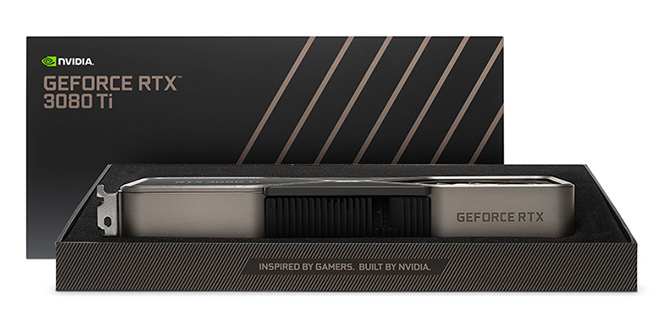
Keeping PCs a couple of steps ahead of the latest consoles, Nvidia's many partners have also released their own designs of the RTX 3080 Ti, offering unique cooling, features and performance. If you want to game on the finest platform this summer, see the full range of GeForce RTX 3080 Ti cards available to buy.